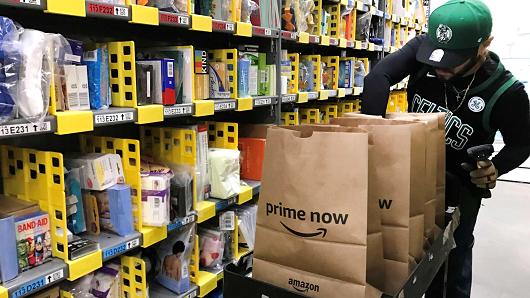
Jeffrey Dastin | Reuters
An employee collects items ordered by Amazon.com customers through the company’s two-hour delivery service Prime Now in a warehouse in San Francisco, December 20, 2017.
Some Amazon sellers could soon get calls from Massachusetts state officials asking for unpaid sales taxes.
On Tuesday, Amazon notified its marketplace sellers that the company has agreed to hand over important merchant information to the state of Massachusetts — including their federal tax ID numbers and the estimated value of inventory stored in Amazon’s warehouses in that state.
The move — which is the first public case of Amazon handing over seller data to state tax officials — will help the state of Massachusetts identify which Amazon sellers may owe them unpaid sales taxes.
It could also mean incredible headaches for the majority of third-party sellers who never comply with various state laws on sales tax collection — if more states follow Massachusetts and demand unpaid taxes from those sellers.
Amazon currently collects sales tax on that products it sells directly, but leaves it up to sellers on the platform to handle their own tax collection. Those independent sellers are responsible for charging sales tax in any state where they have a physical presence, including the states where they store their products.
In the notice to sellers, viewed by CNBC, Amazon said it would share the information with Massachusetts by January 26, 2018. Amazon initially refused to cooperate in September, but said in the note it decided to comply after receiving a “valid and binding legal demand” from the Massachusetts Department of Revenue. It also advised the sellers to consult with a tax adviser because “each seller’s business and tax needs are unique.”
The agreement would serve as an important case as it sets a precedent for other states to follow. The U.S. Government Accountability Office estimates that states are missing up to $13 billion in annual revenue by failing to collect sales taxes from remote sellers.
“It’s game on in terms of sellers being targeted by states,” said BuyBox Experts’ partner James Thomson, who provides advisory service to Amazon sellers. “Less than 10 percent of sellers are actually sales tax compliant, so every state has an incentive to get this information and audit sellers who aren’t collecting.”
 EU News Digest Latest News & Updates
EU News Digest Latest News & Updates



